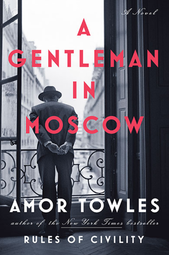A WRITER'S WIT |
My Book World

Any novel in which every word of each chapter title begins with the letter “A” must hint of a certain organization, for this is itself a difficult task. Limiting oneself to only one letter is sort of a self-imposed puzzle-making signifying the author must dig deep to formulate apt titles with his hands tied. At first, one may think that this is a historical novel, and, in a sense, it is. But if it is such, it is also much much more. Some historical novels come off like a literary paint by numbers. History provides the scaffolding and the lazy author must paint characters and story inside certain lines. Not so with Amor Towles’s rendition of this tale from the first half of the twentieth century.
In script form, the novel begins in 1922 with Count Rostov’s “hearing” in front of Soviet officials. There, referring to him as a Former Person, they strip him of his aristocratic status by confining him for the rest of his life to the famed Moscow Metropol Hotel where he has already lived for four years. Things could be worse (think Siberia, think death camp), because Rostov has a lovely large suite of rooms at the hotel. But when he arrives back at the Metropol, the Soviets further strip him by confining him now to a small room in what he refers to as the belfry on the sixth floor, a place where butlers and other servants used to live. He has just enough room for the iron bedstead found there and a few heirlooms he brings from his lavish suite below. Thus begins this era of his life. Oh, and if he should ever step outside the Metropol, he, the Soviets tell him, will be shot on sight. To say much more is to enter spoiler territory. Suffice it to say that Count Rostov deepens friendships with hotel staff members. He establishes an intermittent amorous relationship with a Russian film star. He meets a precocious nine-year-old who grows up, and, because of difficult circumstances leaves her five-year-old daughter to his care until she can return. Which she never does. He becomes the little girl’s Papa, providing the orphan the same kind stability that his grandmother had provided him when he was left an orphan. The novel is rich with historical and cultural references, all in the service of providing readers with a clear view a particular era, one that may not have really ended.
NEXT FRIDAY: My Book World | Julie Andrews's Home Work



 RSS Feed
RSS Feed